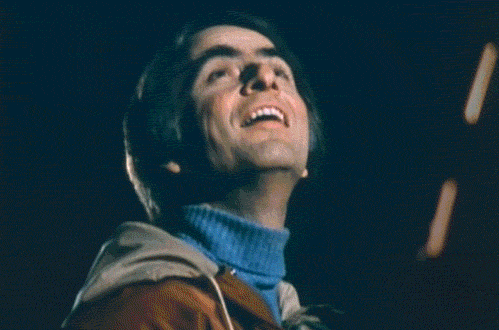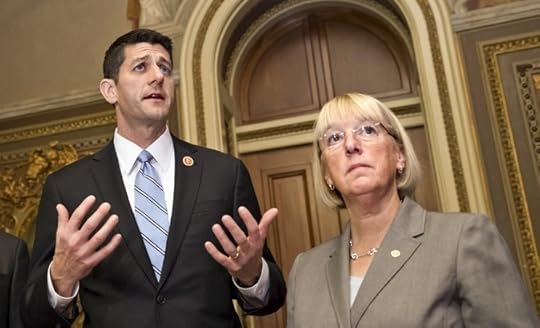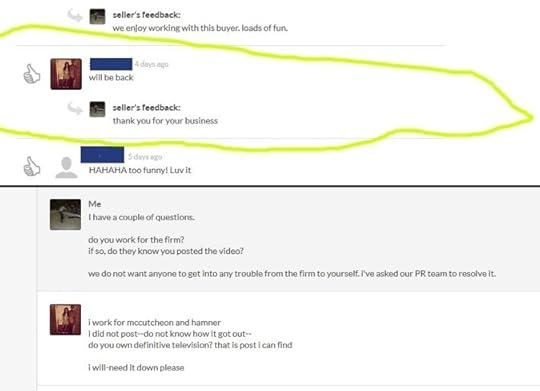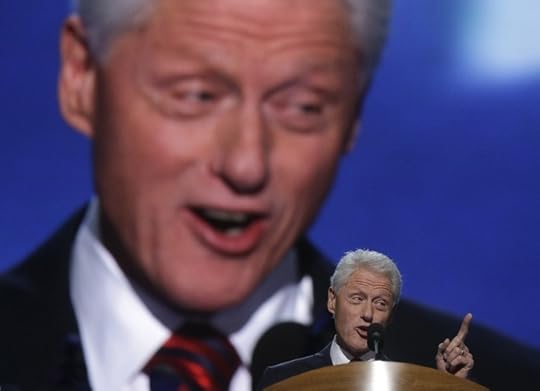Atlantic Monthly Contributors's Blog, page 864
December 4, 2013
How to Draw Two Opposite Conclusions From the Same Climate Change Report
 Polar bear cub Anori swims in her enclosure at the zoo in Wuppertal, June 6, 2012. (REUTERS/INA FASSBENDER )
Polar bear cub Anori swims in her enclosure at the zoo in Wuppertal, June 6, 2012. (REUTERS/INA FASSBENDER ) Both The New York Times and Politico published stories this week based off a climate change report from the National Academy of Sciences titled "Abrupt Impacts of Climate Change: Anticipating Surprises," but somehow came to very different conclusions about what the report means.
Politico opens by warning readers that, according to the report's findings, global warming is happening, and we'll start to really, really notice it soon:
Climate change isn’t just a problem facing future generations, a new scientific report warns, saying the planet could suffer serious and abrupt climate threats in the next few years or decades — leaving nations with a narrow window to adapt.
Times contributor Andrew C. Revkin concluded, on the other hand, that climate change effects are not imminent:
The findings... reinforce the reality that the biggest impacts of greenhouse-driven global warming still lie several generations in the future.
Huh.
The devil, as always, is in the details. The report authors write in the study's abstract that our climate is changing now much faster than it has over millions of years of the earth's development — which isn't really news. They go on to advise world leaders to take action to prevent future, deadly damage to the environment which is, again, standard scientific consensus. Politico appears to be responding to an accelerated time frame mentioned by the authors:
The primary timescale of concern is years to decades. A key characteristic of these changes is that they can come faster than expected, planned, or budgeted for, forcing more reactive, rather than proactive, modes of behavior.
What Politico presumed, apparently, was that the "years to decades" in question are expected to occur within our lifetimes. However, Revkin asked report author Richard Alley (who also worked on a 2002 installment of the report called "Abrupt Climate Change: Inevitable Surprises,") to elaborate on this year's findings, and he explained that drastic change is unlikely before the year 2100:
Enough of the hard work of measuring and modeling has been done to provide high scientific confidence that while we are and will affect the north Atlantic with climate change, and this will have consequences, it is very unlikely that there will be a huge and abrupt change in the coming decades.
Revkin writes that according to the report, there is a moderate risk of certain abrupt shifts — like more intense heat waves and other natural disasters; lower levels of ocean oxygen; and changes in species and ecosystems — occurring in this century. Changes like rising sea levels and climate variability alterations are improbable before, but more likely after, 2100.
Of course, a less severe abruption could still pose a huge threat to human life, and perhaps Politico is focusing on practical ramifications of less-severe effects. Alley says, "Katrina’s high waters just made it over the levee, and the difference between 'just over' and 'not quite over' proved to be a lot of billions of dollars and human disruption." So the distinction between less- and more-severe is not actually all that comforting.
Both articles stress that the report outlined a number of measures that governments must take to rein in the effects of climate change... something that the 20-30 whales currently trapped in the Everglades probably agree is definitely a real thing.












This Alien Hearing Is the Best Thing Congress Has Done in Months
 This artist's rendition provided by NASA shows Kepler-69c, a super-Earth-size planet in the habitable zone of a star like our sun. (AP/HANDOUT)
This artist's rendition provided by NASA shows Kepler-69c, a super-Earth-size planet in the habitable zone of a star like our sun. (AP/HANDOUT) The House science committee carved out two hours of time on Wednesday to discuss the search for extraterrestrial life. Because the House has just seven days of work left before the end of the year, this hearing idea has generated some pretty harsh criticism. But laments about an unproductive Congress finding time to look for aliens of all things are sadly misguided. Today's hearing is a great idea, and it's doing something remarkable: getting the Republican-led, scientifically challenged committee to seriously discuss an important field of research — and the funding needed to keep it going. So stop making fun of it.
 Carl Sagan, smarter than you, and an early
Carl Sagan, smarter than you, and an early scientific advocate for the search for life.
Source: Tumblr
To be clear, today's hearing is not about tinfoil hats, nor is it a call for the Obama administration to release the full contents of the X-Files, which totally exist. It's titled "Astrobiology: The Search for Biosignatures in our Solar System and Beyond." It features testimony from astrobiologists from NASA, MIT, and the Library of Congress. For comparison, here are some other recent hearing topics from the committee chaired by Rep. Lamar Smith, a Texan who, among other things, is a climate change skeptic: "Is My Data on Healthcare.gov Secure?," "Strengthening Transparency and Accountability within the Environmental Protection Agency," and "EPA Power Plant Regulations: Is the Technology Ready?"
Astrobiology is a pretty broad category of study, but it includes the search for earth-like exoplanets beyond our solar system, and the identification of possible biosignatures on other worlds, including Mars. But the research also includes significant work close to home, including research into the past, present and future of life on Earth. Unsurprisingly, that research, and the technology used to complete it, has a cornucopia of very practical applications. Astrobiology technology, for example, was used to locate and map out the plume from the 2010 Deepwater Horizon spill, something NASA's Dr. Mary A. Voytek mentioned in her testimony today.
It's really cool stuff, and has produced a series of exciting discoveries in recent years: before the Kepler spacecraft ended its planet-hunting mission, it collected years of data that indicates there are billions of earth-like planets in the milky way alone. Just yesterday, NASA announced that the Hubble telescope traced signatures of water in the atmospheres of five different planets, orbiting nearby stars. But the research leading to these discoveries are exactly the sorts of programs that the agency might cut if the sequestration is still around in early 2014. As The Alantic explained earlier today, those cuts would likely kill the still-active Cassani mission to learn about nearby planets. The Planetary Society is in the middle of an urgent campaign to lobby Congress to stop those cuts. In the meantime, there are some worrying reports coming from NASA on the near future of the search for other planets:
Wow. NASA is currently have a Town Hall meeting and essentially telling planetary scientists to look for new jobs. Wow.
— Mike Brown (@plutokiller) December 3, 2013
The subject matter of the hearing was so cool, it seems, that the Republican committee members forgot to grill the panelists on why it deserves money in the budget at all. Rep. Chris Stewart, a Republican, asked the scientists "Let's assume that we find life? What do we do then? How does that change things with us in the way we view ourselves?" Rep. Bill Posey, also a Republican, noted, "You've pretty much indicated life on other planets is inevitable. It's just a matter of time and funding." Rep. Ralph Hall, the former chair of the committee who has a pretty bad record of being a science enthusiast, said to the witnesses:
I just don't know how I'm going to tell my barber, or folks from my hometown, about your testimony here. But you must really enjoy waking up each morning and going to work.
These are not the most sophisticated questions and statements in the world. But they are exciting ones, and ones that betray a curiosity and engagement with what science does that is not customarily seen in this wing of Congress. That's in part because planetary research is the sort of research that gets everyone excited. It's kind of a gateway science, which is why it has fruitful applications to science education initiatives, and public engagement. Although it's too early to tell whether today's panel will translate into relief for any of the many, many cash-strapped publicly funded research initiatives in the future (it could very well have no effect at all), these are exactly the kinds of discussions legislators need to have about the programs hurt by budget cuts. With adequate resources and funding, witness Sara Seager told the committee that scientists could find signs of life beyond earth in a generation. But right now, that funding isn't there.












Obamacare Website Enrolled More People in Two Days Than All of October
 AP
AP Now that healthcare.gov is "fixed," people have flocking to the site and signing up for insurance at a furious pace. Roughly 29,000 people signed up for health insurance through the site on Sunday and Monday alone, a government official tells Politico's Carrie Brown, which is more than the total for the entire month of October.
In the program's official launch month, a disappointing and dismal 26,000 people signed up for insurance through the site. November faired a bit better, with 100,000 sign-ups, but the program was still far off from meeting its 7 million person goal by March.
President Obama had promised a fixed site by the end of November, and the administration was anxiously urging people to wait for a repaired site before signing up. They then anxiously waited to see if it would work. After the administration's self-assigned passing grade, it's no surprise the floodgates opened. The good news from Sunday and Monday should give a boost to Obamacare supporters, desperate to stem the tide of bad headlines.
Does that mean the administration's in the clear? No, not at all. Back-end issues still plague the site, and some are worried that will lead to another new chaotic deadline on January 1, when the insurance plans start to kick in. But for now, things are at least heading in the right direction.












Obama Won't Get the Budget Deal He Wants
 Associated Press
Associated Press President Obama called for a few key measures to address income inequality in a speech on Wednesday. He wants a raise in the federal minimum wage and an extension of unemployment insurance — but the budget deal coming together in Congress won't address those issues, according to a Politico report. House Budget Committee chairman Paul Ryan has a chance to get a victory, but it will be a small one.
Politico reports, "those close to Ryan say they’re quietly confident that his imprimatur — and the desire to finally end a multiyear run of near constant budget and spending showdowns — could attract upwards of half of GOP lawmakers." He's been working with Senate Budget Committee chair Patty Murray to set spending levels for 2014 and 2015. The two are trying to find little ways to save in the budget instead of continuing the across-the-board cuts of the sequester.
A senior Senate aide told Politico,
“Democrats won’t get revenue through closing tax loopholes and Republicans won’t get spending cuts through Medicare and Social Security cuts. So, [the deal is being crafted around] basically a bunch of fee increases and other assorted stuff.”
Congress being what it is, Republicans have already prepared a continuing resolution should a deal not come together. It's a stopgap measure that would continue sequestration cuts at the $967 billion level. The Hill reports that GOP leaders may try to bring this measure up for a vote as early as next week, but House Democrats have already said they won't vote for it. Democratic Rep. Steny Hoyer said Tuesday,
“I’m not going to support a short-term CR that leads to a $967 billion level. I believe that hurts our national security, it hurts our economy and it undermines our responsibility of running government at a level that is productive for our people.”
Obama still wants Congress to go after a bigger deal before their "holiday vacation." That seems unlikely. But Ryan and Murray's small deal could succeed, as long as Ryan gets his votes in line. Politico notes, "even if some conservative Republicans can’t openly support such an agreement, senior aides say they believe they will give their blessing in private, making it easier for a package to get through the bitterly divided House."












Google Dreams of a Robot Workforce
 Man, or machine? (AP)
Man, or machine? (AP) After Amazon's pie-in-the-sky drone announcement, Google decided to tip its hand about one of their own ambitious projects: Building robots to replace humans in the workforce.
The New York Times' John Markhoff reports that Google wants to build a small army of machines that can operate in manufacturing and retail, either in assembly lines or in delivery trucks, respectively. "There are still people who walk around in factories and pick things up in distribution centers and work in the back rooms of grocery stores," Andy Rubin, the project's head developer, and the guy who created the Android operating system told the Times.
So, this confirms it: Google wants robots to take blue collar, low-wage human jobs.
Google doesn't yet have robots as responsive as, say, DARPA's T-1000 rescue robots. But the company plans to purchase, or has already purchased, enough small companies working in robotics to develop a robotics team that can come together to as one, giant Voltron-like unit. Some of those pieces are already in place, per the Times:
Among the companies are Schaft, a small team of Japanese roboticists who recently left Tokyo University to develop a humanoid robot, and Industrial Perception, a start-up here that has developed computer vision systems and robot arms for loading and unloading trucks. Also acquired were Meka and Redwood Robotics, makers of humanoid robots and robot arms in San Francisco, and Bot & Dolly, a maker of robotic camera systems that were recently used to create special effects in the movie “Gravity.” A related firm, Autofuss, which focuses on advertising and design, and Holomni, a small design firm that makes high-tech wheels, were acquired as well.
The eventual goal is to have robots working on manufacturing lines and running delivery services. Paired with Google's self-driving car project, perhaps, the company can create the first ever completely automated delivery service. Delivery faster than a Domino's pizza, and no obligation to tip. That doesn't sound so bad, really.
The other worry is that Google is unknowingly building the small infantry army that will fall in line with DARPA's much more powerful killing machines, and humans will all succumb to the robot revolution to come. That doesn't sound as good.












Sex Scene Screened Before 'Frozen' Probably Wasn't 'Nymphomaniac,' Unfortunately
 Magnolia Pictures
Magnolia Pictures The sex scene that was shown before a screening of Frozen in Florida was probably from Dallas Buyers Club, but likely false reports that it was a trailer for Nymphomaniac is only good for Lars von Trier's crazy sex movie.
Reports emerged yesterday that a sexually explicit scene accidentally played before a screening of the Disney musical Frozen at a Regal Cinemas in Florida. After picking up a story from Fox 13 News, Gawker's Neetzan Zimmerman added a link to a story from UK site Mosh News in which a "reader" said it was the very explicit trailer for Nymphomaniac. Now, that was likely not the case. A representative for Magnolia Pictures, the distributor of Nymphomaniac, told The Wrap's L.A. Ross that it is "extremely unlikely it was anything from Nymphomaniac." The trailer is only available online and wasn't sent to exhibitors, the rep said, meaning that "it would’ve had to been uploaded from the internet and repurposed by a particularly twisted projectionist."
The Tampa Bay Times' Steve Persall wrote that "spokesman for Regal Cinemas called it 'an isolated incident' caused when a 'wrong movie' was started, suggesting it might have been the R-rated Dallas Buyers Club, which begins with Matthew McConaughey's character having sex with two women in a rodeo stall." That makes a whole lot more sense.
That said, the rumor that the Nymphomaniac trailer showed before Frozen is great business for Nymphomaniac. The campaign for the film, which doesn't even have a U.S. release date yet, has been brilliant. There have been suggestive posters, clips from "chapters" of the film—which has a five and a half hour director's cut—have been released over the course of months, and finally, there was that trailer that just went there. And by "there," we mean "the whoring bed." If the Nymphomaniac images had shown before Frozen, it would have fully completed the image the marketing team is trying to create that Von Trier's sexy sexy sex times are infiltrating every cinematic orifice. (Sorry.) In fact, Magnolia jumped on the Gawker story tweeting out the link with a big Nymphomaniac hashtag:
Movie Theater Sorry for Playing Graphic Sex Scene Instead of Frozen. @gawker #NYMPHOMANIAC http://t.co/PZimdrudXk
— Magnolia Pictures (@MagnoliaPics) December 3, 2013
Magnolia's rep implied that was more a "tongue-in-cheek" gesture, according to Ross. It was also great advertising.












45% of Uninsured Republicans Would Rather Pay the Obamacare Fine Than Get Insurance
 AP
AP More than one out of four, or 28 percent, of uninsured Americans say they are more likely to pay the individual mandate fine than buy insurance, according to a new Gallup poll. On the other hand, 63 percent of uninsured Americans plan on just getting insurance. What's fascinating, though not surprising, is how this decision splits along party lines. Uninsured Republicans are far more likely to prefer to go without insurance than uninsured independents or Democrats.
Surprisingly, uninsured young invincibles — people 30 years old or younger — are slightly more likely to get insurance (68 percent) than older people (60 percent). So, instead of saying that young people aren't signing up, it might be more accurate to say they haven't signed up yet. Older Americans, as well as those who lost their insurance during the recession, are more likely to sign up for insurance early because they're more motivated. As Politico noted last month, they were also much more likely to spend hours on the buggy federal exchange, which was previously blamed as the main deterrent for millennials. Healthy people, especially young people, are motivated by fines and deadlines, which don't come into play for a few months. And maybe some uninsured people think it might be nice to have health insurance.
One group not motivated by fines, or illness, is Republicans. Nearly half (46 percent) plan on getting insurance, while 45 percent plan on paying the fine. Thirty-one percent of independents plan on paying the fine, as do 15 percent of Democrats. Here's the full breakdown:

This is good news for the Obama administration. Young people aren't less likely to enroll, and knowing about the insurance requirement also doesn't sway people one way or the other. Being Republican does. Gallup acknowledges that, for the right, "the decision to pay the fine could be a form of protest against the law," though they note there's a difference between saying you'll pay a fine and actually paying it.
On that note, one thing to consider is that there's been a lot of confusion about the individual mandate and the fine. Specifically, how much is it? The standard number thrown around is $95 for the first year, but that's just the minimum. The actually fine for a single person is 1 percent of taxable income, which is everything over $10,000. Forbes lays it out here. Meanwhile, a late November Huffington Post/YouGov poll found that most (43 percent) of respondents think there are no exceptions to the mandate, though there are allowances for hardship, as well as low income and religious exemptions. Four percent of respondents didn't think there was a mandate at all, proving once again that misinformation is one of the law's biggest roadblock.












December 3, 2013
Where a Racist Comedian Draws the Line
 YouTube video still
YouTube video still The creator of a now-infamous video depicting a cartoonishly racist Asian man insists that you just don't get his lowbrow humor. He is like Justin Bieber and you are not a Belieber. And, since you asked, yes, he'd also mock a black person in a video. But not if it were shown at a church.
On Monday, an ad for an Alabama law firm featuring a ridiculously racist caricature made its way across the web. The law firm quickly denied involvement in its creation, blaming the firm Definitive Television that was hosting the video. We tracked down the video's creator and star, Jim DeBerry of Orlando, Florida — who then read the article and reached out to us to defend his work. Being much more interested in how someone might justify the video, we got him on the phone.
"I'm in the middle of a Spike television production thing," DeBerry told The Wire as soon as we called. "I'm going to put you on hold for about 30 seconds." We waited patiently. When he returned from that pressing business — which didn't come up again in our 15-minute conversation — we first walked through his dispute with the law firm, McCutcheon & Hammer. The firm, understandably, isn't interested in being linked to the character DeBerry calls "Mr. Wong Fong Shu."
But DeBerry claims someone — who he said he wouldn't or couldn't name — contacted him to make the spot. He sent us some frankly baffling screenshots that he said proved his case (visible at the bottom of the post), and insisted that because he used a "third party intermediary, kind of like a broker," he couldn't say who'd requested it. Just that it was someone else. Asked why he wouldn't pull the law firm's ad, he explained, "If it's a bad movie a director doesn't like, you can't just make it go away. It's part of your profile and it's part of your make-up and we're not going to stop at this point."
@HockeyTarheel @NPMRP a satire video and a racist are 2 different things. I appreciate the view & recommend fact checking the definition
— Jim DeBerry (@RealJimDeBerry) December 2, 2013
We were more interested in exploring how DeBerry figured it was appropriate to make a few bucks by doing racist skits. On Twitter, he defended it as satire. To us, he explained was just "lowbrow humor," and that he had "plenty of data and plenty of individuals" who thought it was just fine. DeBerry explained his firm's philosophy:
We understand that no one wants to be chastised for liking something that may be considered unpopular by others, kind of like Justin Bieber or Britney Spears are going to get counterculture backlash. And some lowbrow stuff such as Jerry Springer's going to get backlash.
We're not saying the cheesy marketing videos we create aren't lowbrow. If any client wants to come to us and provide a script, whether it's a business or an individual, whatever they're using it for, we're happy to create it for them.
As long as it's not death or violence. Or drugs.
He does other characters, too — a dumb cop, a weird cowboy, a chef — but the Asian man is clearly different. We asked if he drew any distinction.
I mean, there's individuals like Ken Jeong, from The Hangover and multiple movies — who I believe is a gay actor, if I'm correct — and he parodies himself, self-deprecation. I don't believe there's a difference in my opinion, respectfully. Everyone's entitled to have their opinion. If they like Jim Varney or don't like Jim Varney or if they like Jim Carrey's character, or don't, that's a matter of opinion. And that's the great part about living in the free world.
(Note: Jeong is married to a woman.) At one point, DeBerry clarified that he only does the characters. "We don't write any of those scripts, by the way," he said. "I'm not a huge fan of other people's copy. Some of them, I think the copy's not very great at all."
We asked him where he drew the line in terms of caricatures. For example, would he do a video in which he played a black person? "Have I thought about it? Sure," DeBerry said.
I think it's appropriate depending on the platform. Is it appropriate to do in a church? Absolutely not. In an appropriate setting is it OK to do some of those characters? Sure.
We do have a black character that we use, that we've used on the radio in the past, that's on iTunes. Would we do one if someone offered us? I've thought about in the past creating like a parody of an African-American, but I don't think that the cheesy time of videos that we create, or cornball marketing videos that we create, I don't think we'd be as successful.
"And," he added, "I don't think I have the right props to pull that off."
The question for DeBerry is an economic one. If people keep paying him to play an Asian stereotype, he's game. Want him to impersonate a black person? As long as it's not in church or about drugs. But over the course of the conversation, we weren't able to identify a single customer that had paid DeBerry the "under $100" to "over $1,000" he said he got for his videos. He seemed reluctant to do so, not wanting to "out anyone" since he's "in the business of capitalism, where people can buy from us for their individual purpose or business purpose as they choose." Nonetheless, he assured us he'd try and find a client for us to speak with. Was it OK if the client was international, he asked? It was. So far, DeBerry hasn't emailed back.
The evidence DeBerry provided.













Bill and Rob's Excellent Drug Excuses
 AP
AP Today, Bill Clinton finally admitted he has smoked weed all those years ago. He had no idea there was any confusion because, like Toronto's crack mayor Rob Ford, he thought his original explanations were enough.
When politicians are accused of doing drugs, they always initially deny, deny, deny everything. In almost every situation, some deft linguistic gymnastics keeps them out of trouble for at least a little while. Clinton once merely answered with "none of your business," and Ford wielded a "no comment" statement like an expert swordsman for a period. Clinton's most famous denial came in 1992, during a television interview in England, when the then-Arkansas governorDemocratic candidate described his affection for the taste of rolling papers:
When I was in England, I experimented with marijuana a time or two, and didn't like it. I didn't inhale and I didn't try it again.
Many understood this to be a denial. Clinton was always understood to have, at least on the record, never smoked marijuana. The smoke didn't enter Clinton's lungs, so he never got high. And he never, ever smoked again. The world was convinced.
Shortly after word of the crack video surfaced, Rob Ford similarly shot down his alleged drug use:
I do not use crack cocaine, nor am I an addict of crack cocaine.
For months, this was Rob Ford's go-to denial when accused of smoking crack cocaine. Many reporters, including ones from The Wire, noted that Ford did not deny smoking crack. He just wasn't a user of crack.
But then, one day, Ford said this:
Yes I have smoked crack cocaine probably in one of my drunken stupors about a year ago.
Strangely Ford tried to defend his months of denials by accusing reporters of "asking the wrong questions," which, we assure you, they did not. Ford was asked every combination of "do you," or "have you" followed by some conjugation of "smoke" and the noun "crack cocaine." Ford always said no.
Finally, today, Clinton came clean about his own drug use all those years ago. In an interview with Fusion, Clinton said he was open all those years ago:
I didn’t say I was holier than thou, I said I tried. I never denied that I used marijuana. I told the truth, I thought it was funny.
Now it was all a joke. The "didn't inhale" line that followed Clinton's weed rumors for years — decades, even! — was all a joke. He thought everyone knew. The "explainer-in-chief" somehow didn't make that clear through the haze.












Rick Rubin and Q-Tip Are Producing Kanye's 'Yeezus' Follow-Up
 AP
AP Last week (or a decade ago, as far as the Kanye news cycle goes), we speculated hopefully on the Yeezus follow-up that Kanye West, somewhat incredulously, claims he's already working on. Specifically, we hoped producer/Gandalf-lookalike Rick Rubin would return for round two, given the magic he worked on the aforementioned album.
Those prayers have been answered, and then some. In an interview with journalist Elliott Wilson (via Pitchfork), rapper Q-Tip, of A Tribe Called Quest fame, reveals that he and Rubin are both producing the as-yet unnamed album. (No word on whether they'll each take a handful of tracks or work together on the whole thing.) Q-Tip not only took part in sessions for 2010's My Beautiful Dark Twisted Fantasy, but has also been on tour opening for West as part of A Tribe Called Quest. So, if West continues tapping into his tour mates to work on the next LP, start looking suspiciously at Pusha T and Kendrick Lamar now.
In case West is reading this, our other humble requests for the follow-up:
Also on the wishlist: another record as lean and tightly wound as Yeezus, which is scarcely half the length of, say, The College Dropout. (Rubin reportedly chopped it from 16 tracks down to 10, saving those six rejects for this ostensible follow-up.) And more racially-minded social commentary, along the lines of the eerily astute "New Slaves," would be nice, too.
And here's what we don't want, in a nutshell: misogyny, a return to skits, and "I'm In It"—Yeezus's only cringe-worthy weak spot.
And here's the full interview with Q-Tip:












Atlantic Monthly Contributors's Blog
- Atlantic Monthly Contributors's profile
- 1 follower



